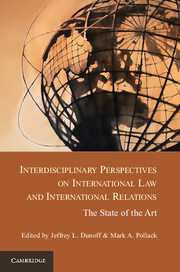 Interdisciplinary Perspectives on International Law and International Relations
Interdisciplinary Perspectives on International Law and International Relations Published online by Cambridge University Press: 05 January 2013
Since the cataclysm of World War II, the international order has grown increasingly institutionalized. Hundreds of international organizations (IOs) and tens of thousands of treaties now exist, many with widespread – and in some cases nearly universal – membership. International institutions existed before 1945, of course, and even before the outbreak of World War I. But compared to these earlier eras, the international system today is far more densely populated by rules and institutions.
At one level, this is a sign of the robustness of international cooperation. Great wars yield great reorderings, and the reordering that took place after 1945 was unusual in its focus on the construction of a rule-based and multilateral system (Ikenberry 2000; Patrick 2009). Yet, the significance of the postwar growth of rules and institutions is contested. For some, it is a sign of healthy maturation toward a more cooperative world, increasingly “lapt in universal law” (Tennyson 1881: 54). For others, international institutions are simply big government writ global: irrelevant at best and, at worst, a menace to national sovereignty (e.g., Rabkin 2004). Even those inclined toward a positive view of international institutions, however, sometimes see a dark side to the robust growth that has taken place in recent decades. Too many rules, and too many institutions to administer and adjudicate them, can fragment and complicate the international order.
To save this book to your Kindle, first ensure [email protected] is added to your Approved Personal Document E-mail List under your Personal Document Settings on the Manage Your Content and Devices page of your Amazon account. Then enter the ‘name’ part of your Kindle email address below. Find out more about saving to your Kindle.
Note you can select to save to either the @free.kindle.com or @kindle.com variations. ‘@free.kindle.com’ emails are free but can only be saved to your device when it is connected to wi-fi. ‘@kindle.com’ emails can be delivered even when you are not connected to wi-fi, but note that service fees apply.
Find out more about the Kindle Personal Document Service.
To save content items to your account, please confirm that you agree to abide by our usage policies. If this is the first time you use this feature, you will be asked to authorise Cambridge Core to connect with your account. Find out more about saving content to Dropbox.
To save content items to your account, please confirm that you agree to abide by our usage policies. If this is the first time you use this feature, you will be asked to authorise Cambridge Core to connect with your account. Find out more about saving content to Google Drive.